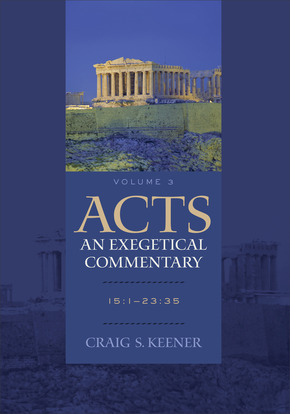Craig Keener: Acts, Volume Three
 Craig S. Keener, Acts: An Exegetical Commentary, Volume 3, 15:1-23:35 (Grand Rapids: Baker Academic, 2014), xxxix + 2193-3348, ISBN 9780801048388.
Craig S. Keener, Acts: An Exegetical Commentary, Volume 3, 15:1-23:35 (Grand Rapids: Baker Academic, 2014), xxxix + 2193-3348, ISBN 9780801048388.
Those familiar with Craig Keener’s works will understand when I characterize his third volume on Acts as an encyclopedia of background, history, and solid exegesis all from a conservative evangelical stance. This mammoth tome runs from p. 2193-3348, with an additional 26 two column pages of the abbreviations used! This volume by the Asbury Theological Seminary professor covers Acts 15-23.
Keener argues that the Jerusalem Council met in 48 C.E. and should be paired with Gal 2:1-10. He thoroughly covers the Council’s meeting and its conclusions on the issues in just over 100 pages. Keener comments extensively on Jewish-Gentile marriage as seen in Timothy’s parents in Acts 16:1.
The Holy Spirit’s guidance in Acts 16:6 was primarily negative awaiting the vision of the Macedonian man in 16:9. Keener asserts that the Spirit forbade Paul’s movement into Asia to allow Paul to gain experience in Macedonia and Achaia against political and philosophic foes that would strengthen him for battle later on in Ephesus. He notes that the phrase “the Holy Spirit,” used only twice in the OT is now the standard nomenclature for God’s Spirit in 16:6 and that the next verse identifies the Holy Spirit as “the Spirit of Jesus” in the UBS Greek text. This title for the Holy Spirit is unique to the NT.
Luke’s use of the first person plural “we” in his factual narratives identifies Luke as an eye witness in a group setting while keeping the focus on Paul and Silas and their larger mission. Keener discusses this “first person” issue and numerous other historical examples of it from other ancient writers. Keener points out the propriety of Paul’s company accepting the hospitality of Lydia and has excursuses on hospitality and inns in the ancient world.
Keener gives many pages to explaining “Pythoness Spirit” and “Demons and Spirit Possession” (pp. 2422-2456). Paul’s expulsion of the slave girl’s false spirit (16:18) is the first miracle Luke records on Paul’s second journey. Acting in Jesus’ name ties Paul to Jesus’ ministry in Luke’s Gospel (Lk 10:17).
Various ancient views on suicide accompany Keener’s treatment of the Philippian jailor who almost took his own life. The salvation of the jailor and his family was purely by faith in Christ.
Keener carefully notes how Luke chronicles Paul’s movements, for example, escaping from Thessalonica at night. Keener sees this as courageous and at the behest of the new Christian leaders of that city. Though Paul was willing to die for Christ, to stay in Thessalonica may have caused his death for a charge of treason, and may have jeopardized the new church’s continuance. Instead, both prospered.
The Epicureans and the Stoics are covered with extensive excursuses as background for Paul’s visit to Athens. Paul’s speech on Mar’s Hill also receives attention for its rhetoric and use by Luke in reporting speeches.
Category: Biblical Studies, Winter 2016


